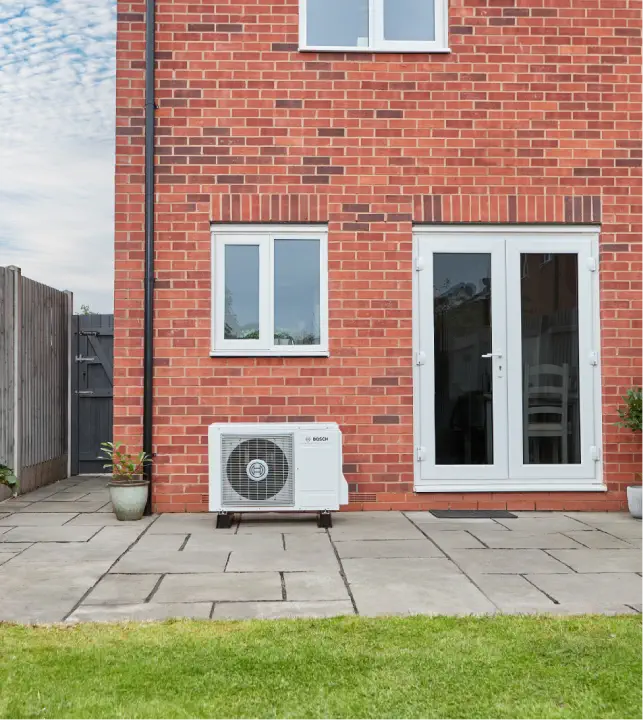We all know we should be a little greener and do our part to protect the environment. Especially now, when storms and floods are becoming more common, and we’re regularly reaching record-high temperatures. It’s never been more important to do what we can to slow climate change.
With 14% of the UK’s total carbon emissions coming from home boilers, how we heat our homes can have a huge environmental impact.
One of the most eco-friendly changes you can make to heat your home? Installing a heat pump. These heating systems run on electricity, so they don’t rely on the fossil fuels that contribute to climate change.
If you want to take things a step further to make your home even more environmentally friendly, installing solar panels will not only reduce your carbon footprint, but also save you money.
The question is, can solar panels power a heat pump?
That’s exactly what we’ll discuss in this blog! Read on to find out how heat pumps and solar panels work together to maximise your home’s energy efficiency.
Is my home suitable for solar panels?
Before we go any further, it’s important to consider whether solar panels will work for your home. Most houses are great candidates, but some factors may interfere with optimal solar panel function, including:
- North-facing roof: It’s not impossible to install solar panels on a roof that faces north, but it’s not ideal. A south-facing roof will generate the most solar power, as it’s in the sun’s path all day.
- Shaded area: If your home sits in the shade for most or all of the day, it may not be worth investing in solar panels. While they don’t need heat or direct sunlight to work, they do need daylight. So, if your roof is shaded by tall trees or nearby buildings, the solar panels won’t be able to perform to their full energy-efficient capabilities.
- Listed building: These buildings are defined by the Secretary of State as being of “special architectural or historic interest”. To install solar panels, you’ll need to get listed building consent (LBC) from your local council. Even if you’ve gotten LBC, you may still need to apply for planning permission.
If any of these factors apply to you, don’t worry—it may still be possible to install a solar panel system in your home. Your local professional installer can answer any questions you have about costs, whether your house has the roof space, and how many solar panels you’ll need.
How heat pumps work
A heat pump heating system works by using electricity to move warmth in the outside air into your home. By taking the heat from the environment rather than from fossil fuels, they’re a more energy efficient option—up to 300%, in fact!
The 2 main types of heat pumps available are:
- Air source heat pumps, which take heat from the outside air
- Ground source heat pumps, which absorb heat from the ground
It’s important to keep in mind that like any heating system, heat pumps work best when your home is well insulated. If you have a draughty house on your hands, all that warmth from the heat pump will escape, wasting electricity and money in the process.
How solar panels work with heat pumps
Now that we’ve taken a closer look at them separately, how do solar panels and heat pumps work together?
Heat pumps and solar panels are a dynamic duo. Solar panels work by converting sunlight into renewable energy to produce hot water and generate electricity. This electricity can also power your heat pump.
A heat pump needs far less energy to run compared to a standard gas boiler. For every kilowatt of electricity that your heat pump uses, you get 3 to 4 times more heat in return. And because it can do so much with so little energy, they don’t put much strain on solar panels.
And by adding a solar battery system, you can rest assured that your solar panels can help keep your home warm even as the nights draw in.
The benefits of combining a heat pump with solar panels
These two are a match made in eco-friendly heaven. Unless you’re looking to live off-grid entirely, there are few greener ways to heat your home than with a solar powered heat pump. Here are some of the benefits you’ll enjoy if you combine the two:
Lower energy bills
Heat pumps and solar panels are undoubtedly an investment, but they pay off in the long run.
- The average UK home will pay between £7,000 and £30,000 to buy and install a heat pump. But, if your heat pump meets certain efficiency standards, you can avail of a government grant of £7,500 to help offset the cost of an air source or ground source heat pump for your home.
- Solar panel installation, including a battery, for a typical three-bedroom house in the UK averages around £9,600. There are several government schemes available to help subsidise the cost.
This might seem like a lot to pay upfront, but it’s money well spent. Solar panels can save you between £440 and £1,005 annually on electricity costs, and adding a battery can cut your energy bills by up to 70%. Typically, you’ll break even on costs around 9 years into having them.
Current electricity costs are high—24.50p per kWh with a standing charge of 60.99p per day. Adding solar panels to your roof to fuel your heat pump means you’ll save on electricity costs to heat and power your home.
An eco-friendly home
Both solar panels and heat pumps are effective ways to reduce your carbon footprint. Neither rely on fossil fuels or emit harmful CO2 emissions. By combining both, you can create an energy-independent and sustainable home.
Combining a heat pump and solar panels is an effective way to cut down on your energy bills while also doing your part for the environment. With so many government grants and financial assistance schemes available for both heat pumps and solar panels, being more eco-friendly has never been easier.
Comfort all year round
Heat pumps bring the warm air inside when it’s cold out—and they take warm air out in the warmer summer months.
And with a solar-powered battery system, you can depend on comfort day or night, rain or shine, all year round.
Make your home greener with a Julian Bland Ltd heat pump
Keep your home comfortable all year round with a heating system that’s good for the environment and, if combined with solar panels, great for your wallet, too.We specialise in a range of heating systems for your home, including energy efficient heat pumps. Our team of professional engineers offer installation, repair, and maintenance services, so no matter the problem, we can help.
Get in touch today, and let’s take the next step to making your home as cosy as it is sustainable.


